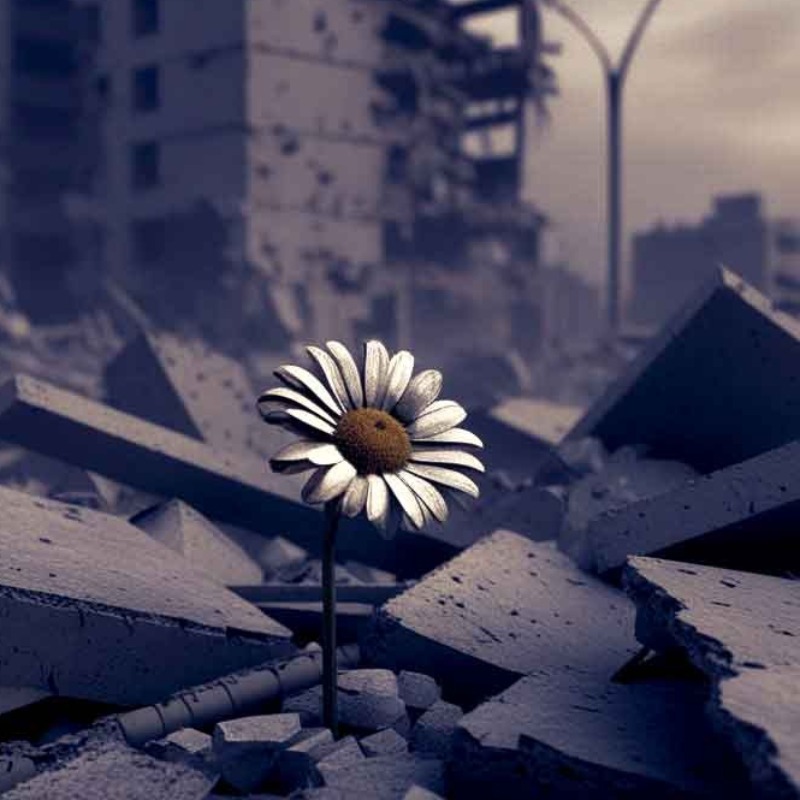“If this belief from heaven be sent,
If such be Nature’s holy plan,
Have I not reason to lament
What man has made of man?”
- William Wordsworth
The house stood still beneath a bruised sky, one of those houses that has long forgotten laughter. Its windows were dark mirrors, reflecting nothing but a world turned away. Silence lay like dust on every corner.
It was on such a day that the knock came.
Not a knock, but a whisper upon wood. So soft, so reluctant, it could have been the wind trying not to be heard.
Mrs. Elspeth Crane, a woman stitched together by habit and the sour ache of years, paused with her hand upon the teapot. Her bones were brittle with silence. No one knocked at her door not since her son had left for a war of someone else’s making and never returned.
She opened the door.
Standing on her doorstep was a boy. He was impossibly small. The kind of small that breaks something in you because it should not be alone. Three years old, perhaps. Skin the colour of sunbaked olives, hair matted with soot, eyes the solemn moons of an ancient night.
He wore no shoes.
His clothes were a ruin.
In his hand, he held a wilted flower.
Mrs. Crane stared at him as though she had seen a ghost. And perhaps she had.
“Are you lost?” she asked.
The boy did not answer in words. Instead, he held out the flower.
She hesitated, then took it. It was a broken wild daisy, the kind that refuses to die even under bootheels. A thing that persists, even in places where nothing should grow.
The boy stepped inside.
She didn’t ask his name, and he didn’t offer one. But he walked into the heart of the house as if it had once belonged to him. He touched the wallpaper with reverence, as though reading Braille written by the hands of time. His small feet left no mark on the floorboards.
“You can stay until the rain stops,” she said, though the skies had not yet opened.
The boy nodded.
That night, he sat at her table and drank milk from her dead son’s cup. She watched him as though afraid that blinking would erase him. He was quiet, but not in the way of children who sulk. It was the quiet of deserts, of places where too many screams had already filled the air.
Later, when she tucked him into the guest bed...a bed too soft for someone who looked like he'd only known rubble...he looked up at her and said, in the gentlest Arabic-tinted English:
“I told God everything.”
Mrs. Crane froze.
“What do you mean, dear?”
He looked past her. Past the walls. Past the years. “When I died… I told Him everything.”
She swallowed the air. It tasted of ash.
“You're… dead?”
He nodded.
“And now you’re… here?”
The boy sat up, solemn. “God said: 'Tell them what you told Me.'”
“And what did you tell Him?” she asked, though her hands trembled and her heart beat like a frightened animal.
“I told Him about the sea, and the sky that swallowed my family. I told Him about bombs that fall like rain, and how the world watched with dry eyes. I told Him about borders sharper than knives, and men who counted money while we counted bodies.”
She felt her knees buckle, but she did not fall.
“I told Him I was three, and I knew what fear tasted like, like salt and smoke and silence. I told Him that I cried with my brother in the boat, and no one came.”
Mrs. Crane sat on the edge of the bed. Her eyes were glass.
“And what did God say?”
The boy looked at her, and in that gaze was the gravity of stars.
“He wept.”
The word spread in the village. That the old woman who once chased stray cats now spoke to ghosts. That a child was seen in her garden, talking to roses. But when others knocked, there was no child. Only Mrs. Crane, who answered the door with eyes that no longer belonged to the living.
They said she wandered the market now, handing daisies to strangers, whispering, “He told God everything.”
One day, the mayor came to her house. He brought a priest, just to be sure.
Inside, they found the boy’s drawings taped to the walls. Crayon sketches of broken buildings, of faceless men holding guns, of boats sinking under blood-red moons. And one, just one, of a boy with wings standing beside a sleeping God.
“You must let this go,” the priest said gently.
But Mrs. Crane only smiled, a smile as soft as snowfall. “He told me I must remember, because forgetting is how it all begins again.”
“You never had a child visitor,” said the mayor. “There are no refugee camps here. No missing children.”
Mrs. Crane walked to a box and opened it.
Inside were the child’s torn shoes. Mud-crusted. Real.
She handed them to the priest.
That night, the rain came. It came like a confession from the sky.
Mrs. Crane stood at the window, watching the drops race like desperate men. Behind her, the boy sat, legs dangling from the armchair, eyes watching a world that had failed him once.
“You’ve done what He asked,” he said.
“No,” she whispered. “I’m just beginning.”
She turned, but he was gone.
Only the daisy remained on the cushion.



 React
React
 React
React
 React
React
 React
React
 React
React